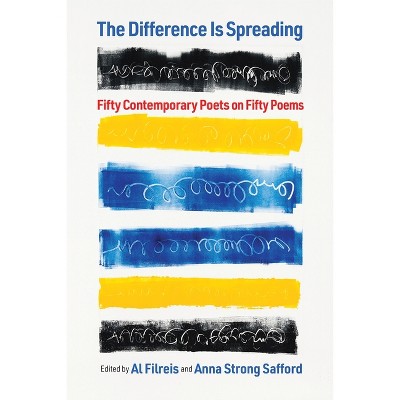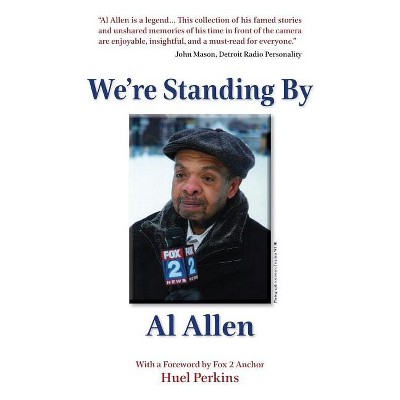Sponsored

1960 - by Al Filreis (Paperback)
$35.49
In Stock
Eligible for registries and wish lists
Sponsored
About this item
Highlights
- In 1960, when World War II might seem to have been receding into history, a number of artists and writers instead turned back to it.
- About the Author: Al Filreis is Kelly Family Professor of English, director of the Center for Programs in Contemporary Writing, codirector of PennSound, and founder and faculty director of the Kelly Writers House at the University of Pennsylvania.
- 352 Pages
- Literary Criticism, Modern
Description
About the Book
"William Shirer's best-selling The Rise and Fall of the Third Reich published in 1960 provided a straight-forward historical/journalistic approach to documenting and accounting for Nazism. The book's publication represented one of the first attempts in America to come to terms with World War II. Shirer's book however, stood in contrast to other, more experimental artistic and literary works of that year that sought to create a new language to understand the trauma of World War II and to imagine a new world. In 1960, Al Filries provides a new understanding of the postwar avant-garde. Looking at a wide range of artists, thinkers, and writers, including Paul Celan, James Baldwin, Frantz Fanon, Muriel Rukeyser and Hannah Arendt, Al Filreis discusses how artists in 1960 turned back to the war of 1939-45 and to the unprecedented horror and mass killings of that period. 1960 reflects on the belatedness of that artistic response and reconsiders the start of the Sixties that went beyond the supposed ideological divisions of the Fifties and the critique of conformity and consumerism inspired by the Beats and others. The work that came out of this period, which linked the legacies of fascism and anti-semitism with American racism, also sought to reclaim the more radical elements of modernism in poetry, fiction, theater, film, memoir, and sculpture. Turning to popular culture, Filreis examines how the teleplays of Rod Serling and the music of John Coltrane, steeped in the horrors of World War II, also provided visions of hope"--Book Synopsis
In 1960, when World War II might seem to have been receding into history, a number of artists and writers instead turned back to it. They chose to confront the unprecedented horror and mass killing of the war, searching for new creative and political possibilities after the conservatism of the 1950s in the long shadow of genocide. Al Filreis recasts 1960 as a turning point to offer a groundbreaking account of postwar culture. He examines an eclectic group of artistic, literary, and intellectual figures who strove to create a new language to reckon with the trauma of World War II and to imagine a new world. Filreis reflects on the belatedness of this response to the war and the Holocaust and shows how key works linked the legacies of fascism and antisemitism with American racism. In grappling with the memory of the war, he demonstrates, artists reclaimed the radical elements of modernism and brought forth original ideas about testimony to traumatic history. 1960 interweaves the lives and works of figures across high and popular culture--including Chinua Achebe, Hannah Arendt, James Baldwin, Amiri Baraka, Paul Celan, John Coltrane, Frantz Fanon, Roberto Rossellini, Muriel Rukeyser, Rod Serling, and Louis Zukofsky--and considers art forms spanning poetry, fiction, memoir, film, painting, sculpture, teleplays, musical theater, and jazz. A deeply interdisciplinary cultural, literary, and intellectual history, this book also offers fresh perspective on the beginning of the 1960s.Review Quotes
1960 offers a provocative and vivid intellectual history from a literary perspective. Reading works as diverse as John Coltrane's My Favorite Things and Jackson Mac Low's aleatory poetry as part of the belated processing of WWII traumas, it asks us to reconsider the origins, references, and trajectories of the post-war avant-gardes.--Craig Dworkin, author of Dictionary Poetics: Toward a Radical Lexicography
This brilliantly syncretic book confronts the repression of World War II in American culture, circa 1960. Filreis thinks through a constellation of songs, literature, poetry, and films, each pierced by the war. His linked essays show how great art is not only ethically necessary but also a source of endless pleasure. 1960 is a tour de force of critical intelligence.--Charles Bernstein, author of Pitch of Poetry
Al Filreis adds 1960s to the years that matter in 1960: When Art and Literature Confronted the Memory of World War II and Remade the Modern. The story he tells about the art, literature, and film of that year is complicated, one less utopian than many presume, one defined by the despair of World War II, one where it matters that Celan and Baldwin gave talks on the same day in October of 1960. This is a beautiful and complicated book, full of detailed readings of minor and major figures, one that will be known for reconfiguring and contextualizing the avant garde and experimental traditions of that era.--Juliana Spahr, author of Du Bois's Telegram: Literary Resistance and State Containment
About the Author
Al Filreis is Kelly Family Professor of English, director of the Center for Programs in Contemporary Writing, codirector of PennSound, and founder and faculty director of the Kelly Writers House at the University of Pennsylvania. His books include Modernism from Right to Left: Wallace Stevens, the Thirties, and Literary Radicalism (1994) and Counter-Revolution of the Word: The Conservative Attack on Modern Poetry, 1945-60 (2008), and he is the host of the podcast PoemTalk.Dimensions (Overall): 9.3 Inches (H) x 6.1 Inches (W) x .8 Inches (D)
Weight: 1.13 Pounds
Suggested Age: 22 Years and Up
Sub-Genre: Modern
Genre: Literary Criticism
Number of Pages: 352
Publisher: Columbia University Press
Theme: 20th Century
Format: Paperback
Author: Al Filreis
Language: English
Street Date: October 26, 2021
TCIN: 1002952820
UPC: 9780231201858
Item Number (DPCI): 247-23-1732
Origin: Made in the USA or Imported
If the item details aren’t accurate or complete, we want to know about it.
Shipping details
Estimated ship dimensions: 0.8 inches length x 6.1 inches width x 9.3 inches height
Estimated ship weight: 1.13 pounds
We regret that this item cannot be shipped to PO Boxes.
This item cannot be shipped to the following locations: American Samoa (see also separate entry under AS), Guam (see also separate entry under GU), Northern Mariana Islands, Puerto Rico (see also separate entry under PR), United States Minor Outlying Islands, Virgin Islands, U.S., APO/FPO
Return details
This item can be returned to any Target store or Target.com.
This item must be returned within 90 days of the date it was purchased in store, shipped, delivered by a Shipt shopper, or made ready for pickup.
See the return policy for complete information.
Frequently bought together

Trending Book Deals


Highly rated
$22.80
MSRP $38.00
Buy 2, get 1 free select books, music & movies
4.8 out of 5 stars with 14 ratings


$9.85 - $23.09
MSRP $15.99 - $32.99
Buy 2, get 1 free select books, music & movies
4.8 out of 5 stars with 147 ratings

$19.99 - $20.58
MSRP $19.99 - $30.00
Buy 2, get 1 free select books, music & movies
5 out of 5 stars with 6 ratings

$9.92
MSRP $18.99
Buy 2, get 1 free select books, music & movies
4.2 out of 5 stars with 118 ratings










